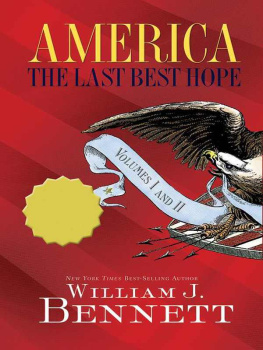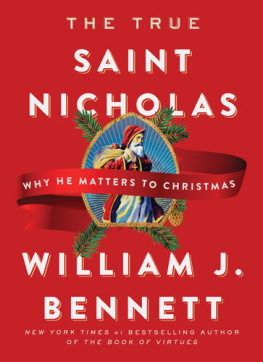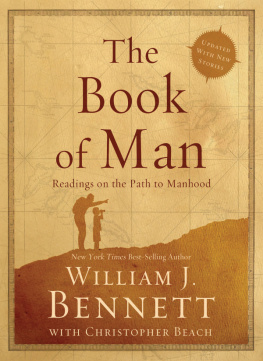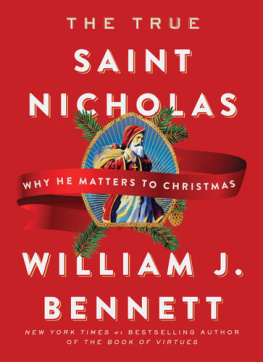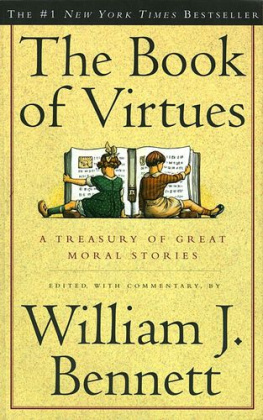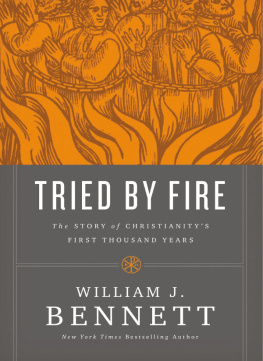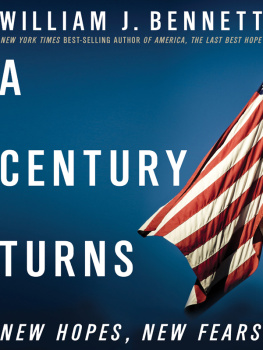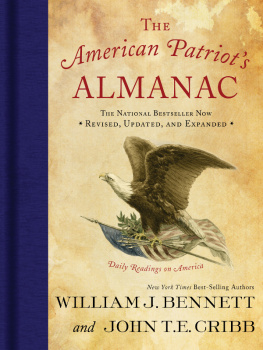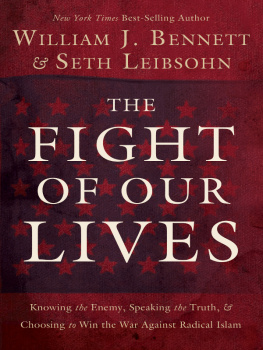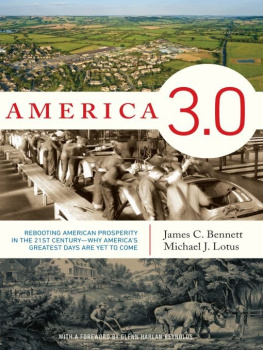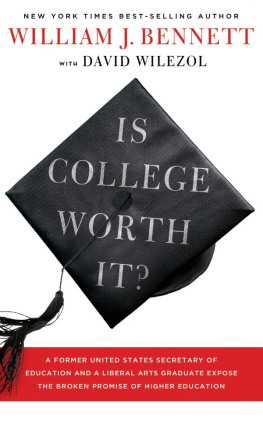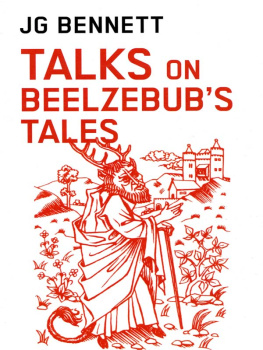MAIN CONTENTS
AMERICA THE LAST BEST HOPE VOLUME I:
FROM THE AGE OF DISCOVERY TO A WORLD AT WAR
14921914
AMERICA THE LAST BEST HOPE VOLUME II:
FROM A WORLD AT WAR TO THE TRIUMPH OF FREEDOM
19141989
AMERICA
THE LAST BEST HOPE
VOLUME I:
FROM the AGE of DISCOVERY
TO a WORLD at WAR
14921914
William J. Bennett

2006 by William J. Bennett
All rights reserved. No portion of this book may be reproduced, stored in a retrieval system, or transmitted in any form or by any meanselectronic, mechanical, photocopy, recording, scanning, or otherexcept for brief quotations in critical reviews or articles, without the prior written permission of the publisher.
Published in Nashville, Tennessee, by Thomas Nelson. Thomas Nelson is a registered trademark of Thomas Nelson, Inc.
Thomas Nelson, Inc. titles may be purchased in bulk for educational, business, fund-raising, or sales promotional use. For information, please e-mail SpecialMarkets@ThomasNelson.com.
Scripture quotations at taken from THE NEW KING JAMES VERSION. 1982 by Thomas Nelson, Inc. Used by permission. All rights reserved.
All interior images: Getty Images.
Library of Congress Cataloging-in-Publication Data on file with the Library of Congress.
Bennett,William J. (William John), 1943
America : the last best hope / William J. Bennett.
p. cm.
ISBN 978-1-59555-055-2 (hardcover)
ISBN 978-1-59555-111-5 (trade paper)
ISBN 978-1-59555-181-8 (student edition)
1. United StatesHistory. I. Title.
E178.B46 2006
973dc22
2006006611
Printed in the United States of America
09 10 11 12 QW 12 11 10 9 8
To the American soldier,
whose fidelity, patriotism, and valor
have made this land
the last best hope of earth.
CONTENTS
This book has been a labor of love. My love for our country has been deepened and made more intense by this project. I could not have completed this task without the help and encouragement of friends and colleagues.
Bob Morrison, my former colleague at the Department of Education, has been with the project from the beginning. He has been of immense help. His effort has been exemplary, and his love of the project has been contagious. With William Faulkner, Bob believes the past isnt deadit isnt even past.
Seth Leibsohn, my producer on Morning in America and a true friend, has graciously given his time and his thoughts to this book. Seths wisdom about, and enthusiasm for, this project have been indispensable.
Noreen Burns has been smart about this book as she is about many things.
Steve Ochs is a great teacher. My sons and many others have benefited from his scholarship and his devotion to his students and this nations past. I am grateful for his selfless contributions to the early chapters of this work.
Vin Cannato read this book and provided many helpful suggestions. A distinguished author and professor in his own right, Vin provided countless insights and helped me fact-check the thousands of facts herein.
Max Schulz and Ken Watson read key portions of this book and provided solid recommendations. I thank each for his friendship and valuable help.
John Cribb had good suggestions. I took them.
Brian Kennedy and the Claremont Institute and Lawrence and Susan Kadish encouraged and supported me and this project. They all think and encourage big. I thank them.
Bob Barnettas usualcounseled, advised, and made the deal that made the book possible.
I thank publisher David Dunham for his warm welcome to Thomas Nelson, Inc. He is accessible and responsive. My editor Joel Miller is painstakingly careful and helpful; I am grateful.
I want to thank my listeners. The callers to my radio talk show have encouraged me mightily by their love for and dedication to this country.
They deserve our best efforts.
Finally, Elayne encouraged, read, and offered her always probing commentary and judgment. I am grateful to her and to my sons for their love and support.
I wrote this book for many reasons. The first and most important is the need for hope. When President Lincoln wrote to Congress in December 1862, shortly after he issued the preliminary Emancipation Proclamation, he wrote, We shall nobly save or meanly lose this last best hope of earth. For nearly a century before that messageand easily for a century afterwardAmericans would not have doubted that this country was indeed that last best hope. In a speech scheduled for delivery in Dallas on 22 November 1963, President John F. Kennedys text read, We in this country are the watchmen on the walls of world freedom. Kennedys view was Lincolns before him and Jeffersons before Lincoln. Later it was Reagans. Democrat, Republican, Federalist, Antifederalist... it hardly mattered. An abiding sense of American greatness, of American purpose, of American exceptionalism has long characterized many of our leaders and tens of millions of the rest of us as well. We have long had hope.
I believe America is still that hope, but I also believe that our conviction about American greatness and purpose is not as strong today. Newspaper columns and television reports are full of cynicism. Many express doubts about American motives on the world stage. Some Americans seem ready to believe the worst about our leaders and our country. Thinking and believing the worst certainly is not hopeful. It is my humble wish that those who read this book will find reason to reclaim some of the hope and conviction we have lost.
The second reason I wrote this book is to give Americans an opportunity to enjoy the story of their country, to take pleasure and pride in what we have done and become. Many books about America not only fail to counter cynicism and hopelessness, they dont encourage anything positive in their place. Some do not engage, entertain, educate, or encourage. History textbooks are often the worst in this regard. National tests repeatedly show that many high school (and college) students know little about their countrys past. Dull histories drive young people awayaway from serious study, away from reading history as adults, away from a reasoned, thoughtful, and heartfelt embrace of their country. Dumbed-down history, civics, andworst of allsocial studies textbooks may be one cause of voter and citizen apathy. An encouraging countertrend is the huge popularity of a few histories and biographies. David McCulloughs 1776 and Walter Isaacsons Benjamin Franklin come to mind. The success of these books is much deserved: they give pleasure, they educate, and they entertain. But few such books have attempted to tell the whole American story. I hope this will be one.
The third reason I wrote this book is to give thanks and to remind my fellow citizens of their obligation of gratitude to those who made it possible for us to lead free and happy lives. To Lincoln and the Founders before him, and to many historical figures afterward, much is due. Obscurity and oblivion are not what they deserve.
Americans can be grateful that time and again, our ancestors and our contemporaries have chosen wisely and have by their demeanors defined us as a people. Over and over again we have shown the almost uniquely American capacity for self-renewal. And over and over again in our story, intelligence and leadership have counted in the nick of time. Think of those Americans at Philadelphia in 1787 who devised the most miraculous political document in history just as the young nation seemed to be falling apart.
Or Americans coming together to rebuild this nation after the long and devastating Civil War.
Or Americans standing fast against totalitarianism during the Cold War.
Next page
